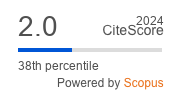Hereditary non polyposis colorectal cancer in a random sample of colorectal cancer patients
Keywords:
Colorectal cancer, Genetics, Endoscopy, HNPCCAbstract
Objective The goal of this prospective research was to determinegenetic and endoscopic changes in patients with sporadiccolorectal cancer and to diagnose HNPCC. Patientsand Methods The group consisted of 40 patients, havingcolorectal cancer. Colonoscopy was performed, genetic testingfor the loss of heterozygousity and microsatellite instability(MSI). Results HNPCC was diagnosed using the Amsterdamand Bethesda criteria in the group of sporadic colorectalcancer in 15% of the cases, and exhibited an MSI-H for thechromosome 2p where the hMSH2 mismatch repair gene islocalized. The greatest number of patients with sporadic coloncancer and HNPCC displayed Astler-Coller B2 and C1spread levels. Conclusion The research results indicate thatthe colonoscopy should be used as a screening method forcolorectal cancer. It is necessary to design a colorectal cancerscreening program for the general population and high riskindividuals. There is a need to form National colorectal cancer,HNPCC and FAP registries.References
Doto GA. More than a break to the cell cycle. Byochemica et Biophysica Acta, 2000; 1471, 43-56.
Vogelstein B, Fearon ER, Hamilton SR, Kern SE, Preisinger AC, Leppert M, Nakamura Y, White R, Smith AM. Genetic alterations during colorectaler tumor divelopment. N Engl J Med. 1988;319:525-9.
Markowittz S, Wang J, Myeroff L. Inactivation of the type II TGF- beta receptor in colon cancer cells with microsatelite instability. Science. 1995; 268:967.
Lynch HT, de la Chapelle A. Hereditary colorectal cancer. N Engl J of Med. 2003; 358 (10): 919-32.
Vasen HFA, Wijnen J. Clinical implications of genetic testing of hereditary nonpolyposis colorectal cancer. Cytogenetic and Cell Genetics. 1999; 86:136-9.
Rodriguez-Bigas MA, Boland CR, Hamilton SR, Henson DE, Jass JR, Khan PM, et al. A National Cancer Institute Workshop on Hereditary Nonpolyposis colorectal Cancer Syndrome: meeting Highlights and Bethesda Guidelines. J Natl Cancer
Inst. 1997;1758-62.
Baba S. Recent advances in molecular genetics of colorectal cancer. World J Surg Sep. 1997; 21: 678-87.
Bell SM, Kelly SA, Hoyle SA, Lewis FA, Tayler GR, Thompson H, Dyon F. C-Ki ras gene mutation in dysplasia and carcinomas complicating ulceratic colitis. Br S Cancer. 1991; 64:174-8.
Cawkwell LA, Lewis FA, Quike P. Frequency of allele Loss of DCC, p 53, RB1, WT1, NF1, NM23 and APC/MCC in colorectal cancer assay by fluorescent multiplex polymerase chain reaction. Br S Cancer. 1994;70:81.
Ponc M, Pedroni M, Benatti P, Percesepe A. Hereditary colorectal cancer in the general population: from cancer registration to molecular diagnosis. Gut. 1999; 45:32-8.
Aaltonen LA, Salovaara R, Kristo P, Canzian F, Hemminki A, Peltomaki P. Incidence of hereditary nonpolyposis colorectal cancer and the feasibility of molecular screening for disease. N Engl J Med. 1998; 338: 1481-7.
Sasaki J, Iwama T, Sato C, Sugio K, Saejima J, Ikeuchi T, Tonomura A, Miyaki M, Sasazuki I. Die Bedeutung von Ernahrungsfaktoren fur Entstehung gastrointestinaler Tumoren. DMW. 1999; 8:306-10.
Ichihava A, Sugano K. and Fujita S. DNA Variants of BAT 25 in Japanese, a Locus Frequently Used for Analysis of Microsatellite Instability. Jpn. 2001;31: 346-8.
Lynch HT, Smyrk TC, Watson P. Genetics, natural history, tumor spectrum, and pathology of hereditary nonpolyposis colorectal cancer. Gastroenterology. 1993; 104:1535-49.
Boland CR. Decoding Hereditary Colorectal Cancer. N Engl J Med. 2006;354:2815-7.





